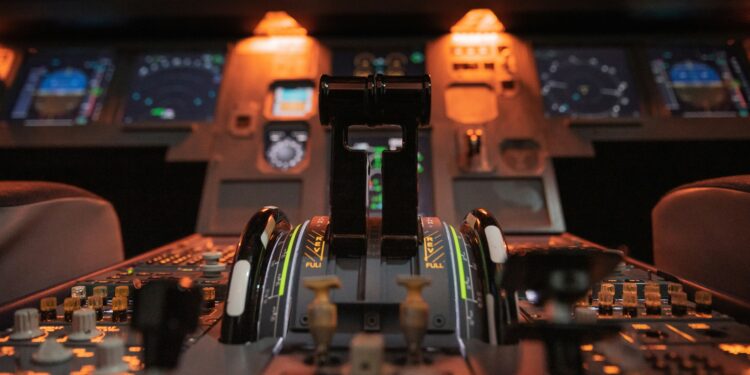Joby Aviation, Inc. (NYSE: JOBY) is a pioneering aerospace company dedicated to transforming how people move within and between cities through the development of electric vertical takeoff and landing (eVTOL) aircraft. Founded in 2009 and headquartered in Santa Cruz, California, Joby has spent more than a decade engineering and testing aircraft designed to provide safe, quiet, and affordable air taxi services. Its mission is to reduce urban congestion, cut travel times, and deliver sustainable transportation solutions that align with the global shift toward clean energy.
The company’s aircraft are designed to carry four passengers and a pilot, traveling at speeds of up to 200 miles per hour with a range of more than 150 miles on a single charge. Unlike traditional helicopters, Joby’s aircraft are engineered for low noise emissions, making them more suitable for frequent use in densely populated urban areas. The vertical takeoff and landing capability means they can operate without the need for conventional runways, opening up opportunities for deployment in city centers, rooftop hubs, and suburban communities.
Joby has achieved significant milestones in the journey toward commercialization, including thousands of test flights and collaborations with regulators to advance the Federal Aviation Administration’s certification process. The company is currently in the later stages of FAA Type Certification, with expectations to begin commercial passenger services once approval is complete. This certification progress underscores Joby’s leadership within the eVTOL sector and positions it ahead of many competitors in the race to market.
Strategic partnerships have been critical to Joby’s growth. Toyota has invested nearly $900 million in the company, bringing world-class expertise in high-volume manufacturing and supply chain management to support scaling production. Joby has also partnered with Uber, integrating its future services into the Uber platform to ensure seamless access to customers once operations launch. These partnerships provide both the financial backing and operational infrastructure necessary for Joby to become a leader in the urban air mobility market.
In addition to partnerships, Joby has expanded its production footprint with facilities in Marina, California, and Dayton, Ohio, where the company plans to manufacture aircraft at scale. Its vertical integration strategy allows Joby to design, build, and test nearly every component of its aircraft in-house, ensuring quality control and accelerating the development process. This approach has also created hundreds of U.S. jobs and established Joby as a driver of domestic advanced manufacturing.
Today, Joby Aviation is widely recognized as one of the most advanced companies in the emerging air taxi industry. With a clear focus on safety, sustainability, and efficiency, Joby is working to redefine short-distance travel and establish itself as a global leader in aerial mobility. The company’s combination of technical maturity, regulatory progress, and strategic backing makes it one of the most compelling names in the future of aviation.
Joby Aviation Positioned to Lead the Future of Urban Air Mobility
Joby Aviation, Inc. (NYSE: JOBY) has firmly established itself as a frontrunner in the electric vertical takeoff and landing (eVTOL) sector, a transformative field aiming to redefine urban and regional transportation. Founded over 15 years ago, Joby has dedicated its mission to developing safe, quiet, and efficient air taxis designed to carry passengers in congested urban areas and underserved regional routes. The company’s long-standing vision is now rapidly converging with reality as Joby takes part in the White House eVTOL Integration Pilot Program (eIPP), a government-backed initiative designed to accelerate the introduction of advanced aerial mobility solutions in the United States.
The eIPP, backed by a recent Executive Order from President Trump, directs the Department of Transportation and the Federal Aviation Administration to facilitate limited eVTOL operations ahead of full FAA type certification. This strategic step recognizes both the maturity of Joby’s aircraft and the urgency of cementing American leadership in the next era of aviation. By participating in this program, Joby gains a pathway to demonstrate passenger transportation, cargo delivery, and emergency response missions in select cities, providing critical operational data while building public trust in its aircraft.

CHECK THIS OUT: CEL-SCI (CVM) Stock Could Explode After Saudi Breakthrough Deal and Ondas Holdings (ONDS) Lands $2.7M Defense Order.
Operational Readiness Validated by Real-World Flight Milestones
Joby’s operational readiness sets it apart from competitors in the crowded eVTOL space. The company has logged more than 40,000 miles of flight testing, including nearly 600 flights in 2025 alone. These rigorous tests have been conducted across five countries under diverse conditions, from the high heat of Dubai to the controlled environments of California.
One of Joby’s most significant recent milestones was its first piloted flight between two public airports, traveling from Marina to Monterey in California. This achievement marked the integration of Joby’s aircraft into commercial airspace and showcased the platform’s ability to operate seamlessly within the existing aviation infrastructure. The successful vertical takeoff and transition to forward flight demonstrate the maturity of Joby’s design, which has been engineered for versatility in both dense urban areas and regional connections where runway infrastructure is limited.
By successfully proving its capability in such varied contexts, Joby has reinforced its status as the most mature eVTOL aircraft program in the sector, a critical differentiator as regulators and communities evaluate which companies are truly ready for real-world operations.
Advancing Through FAA Certification Stages
In addition to operational achievements, Joby is making sector-leading progress toward FAA certification. The company is now in the fourth of five stages in the FAA’s Type Certification process, a demanding framework that ensures the safety and reliability of new aircraft. Joby expects to fly its first of five FAA-conforming aircraft this year, with FAA pilots expected to participate in flight testing early next year.
This certification progress is crucial, as FAA approval remains the ultimate gatekeeper for widespread commercial service. By maintaining strong momentum through the certification pipeline, Joby demonstrates both technical maturity and regulatory readiness. The company’s close collaboration with the FAA further highlights its proactive approach to meeting safety standards and expediting the path to commercialization.
Scaling Manufacturing Capacity with Toyota’s Support
A core strength of Joby’s strategy lies in its ability to scale production through vertical integration. Unlike many competitors, Joby designs, tests, and manufactures nearly every aspect of its aircraft in-house, giving it greater control over quality and timelines. With Toyota as a strategic partner and investor, contributing nearly $894 million to the company, Joby benefits from unmatched expertise in large-scale automotive manufacturing.
The company has recently expanded its Marina, California facility to 435,000 square feet, doubling production capacity to as many as 24 aircraft per year. In addition, Joby is developing a major manufacturing hub in Dayton, Ohio, where the company is expected to ramp up production for larger-scale output. Together, these facilities provide Joby with the foundation to meet rising demand once certification is achieved and to support rapid expansion into multiple markets worldwide.
White House Backing Strengthens Joby’s Position
Participation in the White House’s eVTOL Integration Pilot Program offers Joby more than just validation—it creates a launchpad for early operations in cities and states across the nation. Communities in Texas, Florida, Ohio, New York, and California are already being considered for pilot projects. For states like Texas, where the Center for Advanced Aviation Mobility (CAAM) is fueling interest in next-generation air mobility, Joby’s involvement could establish it as a trusted partner for government agencies, local stakeholders, and urban planners.
The program also underscores the national significance of Joby’s mission. By securing direct alignment with federal priorities, Joby is positioned not only as a leader in the private sector but also as a symbol of America’s commitment to maintaining global leadership in aviation innovation.
Pathway to Commercialization and Long-Term Growth
Joby’s multi-pronged strategy positions it for long-term success. With operational readiness proven through thousands of miles of test flights, advanced FAA certification progress, and scaling production supported by Toyota’s manufacturing expertise, the company is approaching the point of commercialization. By leveraging opportunities provided through the White House’s eIPP, Joby can establish early revenue streams while building infrastructure and community partnerships that will support nationwide rollout.
This convergence of regulatory support, technical maturity, and production readiness makes Joby one of the most compelling investment stories in the urban air mobility sector. While challenges remain, including regulatory hurdles, public adoption, and competitive dynamics, Joby’s leadership position suggests it is best positioned to bring eVTOL technology from vision to reality.
Conclusion: Joby Aviation’s Bullish Investment Case
Joby Aviation is no longer just a speculative bet on the future of transportation—it is a company moving steadily toward commercialization with government backing, proven operational capabilities, and a clear manufacturing strategy. The White House eVTOL Integration Pilot Program marks a watershed moment, giving Joby the opportunity to jumpstart U.S. operations and demonstrate the real-world potential of its air taxi services.
For investors, the bullish thesis is straightforward: Joby combines technical leadership, regulatory progress, and strong industrial partnerships to create a unique growth story in an industry with trillion-dollar potential. If Joby executes successfully on its roadmap, it stands to not only redefine urban mobility but also deliver outsized returns to shareholders who believe in the next era of aviation.
READ ALSO: How Globalstar (GSAT)’s Strategic Apple Partnership is Changing the Satellite Game and Intel (INTC)’s Epic Comeback: Why Wall Street May Be Dead Wrong About This “Dying” Chip Giant.






